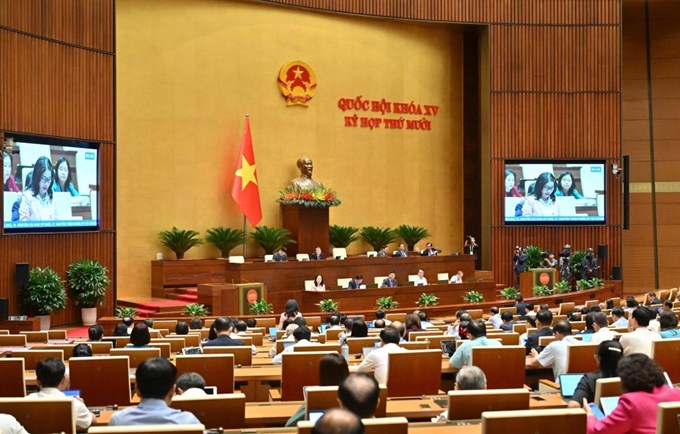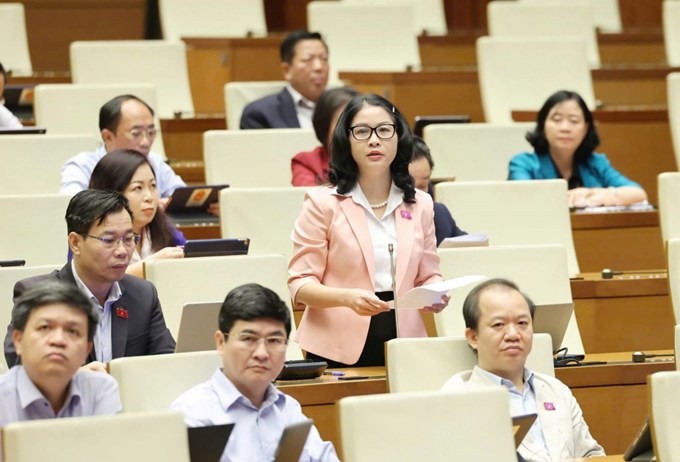Prof. Dr. Nguyen Thi Lan, Party Secretary and President of Vietnam National University of Agriculture (VNUA), and a member of the 15th National Assembly, proposed the implementation of policies to attract and provide incentives for young engineers and intellectuals to work in agricultural extension, particularly in remote and disadvantaged areas.
Shortage of Specialized Agricultural Extension Officers
During the National Assembly session on the afternoon of October 29, 2025, Ms. Nguyen Thi Lan, a member of the National Assembly, highly appreciated the Government’s report, which vividly reflected the nation’s positive development achievements amid numerous challenges and difficulties. She emphasized that as Vietnam entered 2026, the pivotal year of the new term, the Government’s direction to prioritize science and technology, innovation, digital transformation, and green development as the key pillars of progress demonstrated strategic foresight and a sustainable development mindset.
Deputy Nguyen Thi Lan stressed that if the economy was likened to a house, agriculture was the solid foundation, ensuring social stability and national food security. In the process of building a green, ecological, and high-tech agriculture, the agricultural extension workforce played a crucial role. They were the ones who brought policies, science, and technology directly to farmers, transforming knowledge into productivity and tangible value.

The overall view of the meeting session.
According to VNUA’s President, agricultural extension served as the bridge connecting the State, scientists, businesses, and farmers, the “extended arm” that supported sustainable rural development, and the “key” that opened the door to smart agriculture.
Quoting General Secretary To Lam’s directive, she stated, “Agricultural extension is an important task of commune-level authorities; it is necessary to strengthen the grassroots agricultural extension workforce, ensuring close connection with farmers and the fields, and preventing any disruption in extension activities.” This directive reflected a strategic vision for developing modern agricultural human resources.
Deputy Nguyen Thi Lan also pointed out that although localities already had agricultural staff, the number of full-time agricultural extension officers remained limited and uneven in qualifications, especially in remote and mountainous regions.
She commended the issuance of Circular No. 60/2025 by the Ministry of Agriculture and Environment, which provided a clear legal framework to streamline and enhance the efficiency of a two-tier agricultural extension system. However, she emphasized that the core issue lied in training and standardizing the workforce, recognizing it as a strategic link in developing sustainable agriculture.
Four Key Recommendations
To strengthen agricultural extension in response to new development demands, Deputy Nguyen Thi Lan proposed four main solutions as follows: (i) Develop a national competency framework for agricultural extension officers and a standardized, digitalized training program aligned with local development strategies, addressing inconsistencies in standards and uneven quality; (ii) Introduce policies to attract and incentivize young engineers and intellectuals to work in rural areas, especially in remote and disadvantaged regions; (iii) Build a shared national agricultural extension database, connecting data from the provincial to the commune level to provide farmers with timely access and effective support; (iv) Establish a transparent and measurable monitoring and evaluation mechanism to assess whether extension activities truly help farmers improve their capacity and income.

Deputy Nguyen Thi Lan, Hanoi National Assembly Delegation, speaks at the session.
Deputy Lan affirmed, “If agriculture is the backbone of the economy, then the agricultural extension workforce is its nourishing root system. Investing in training and developing agricultural extension personnel is investing in knowledge, productivity, and the future of Vietnamese farmers.”
She also proposed that developing agricultural extension human resources should be included in the National Strategy on Agricultural Human Resources Development until 2035, considering it a strategic criterion in building model new rural areas and promoting sustainable agricultural development.